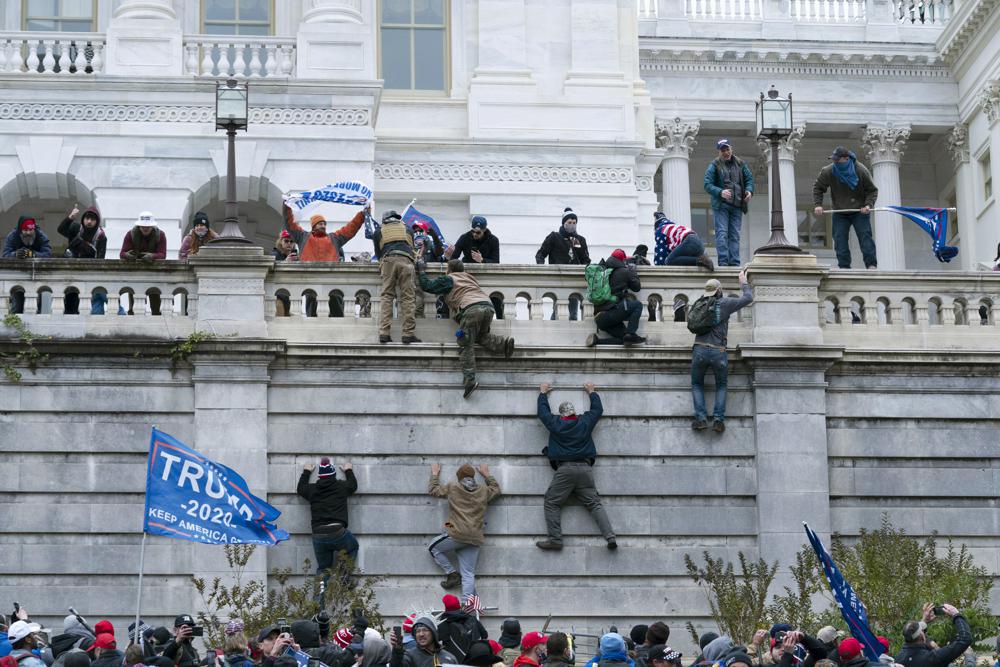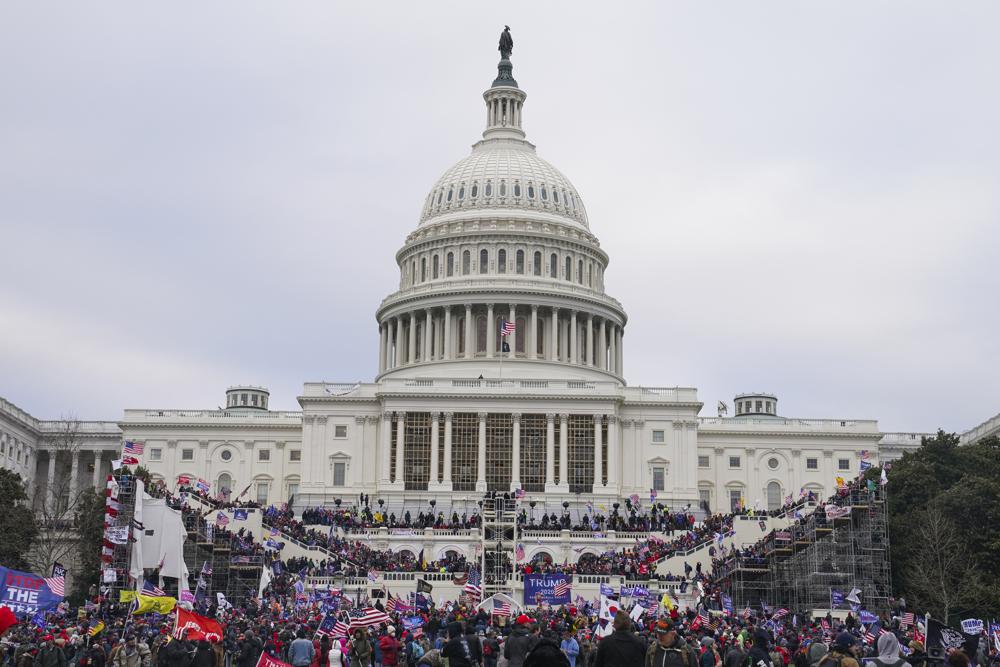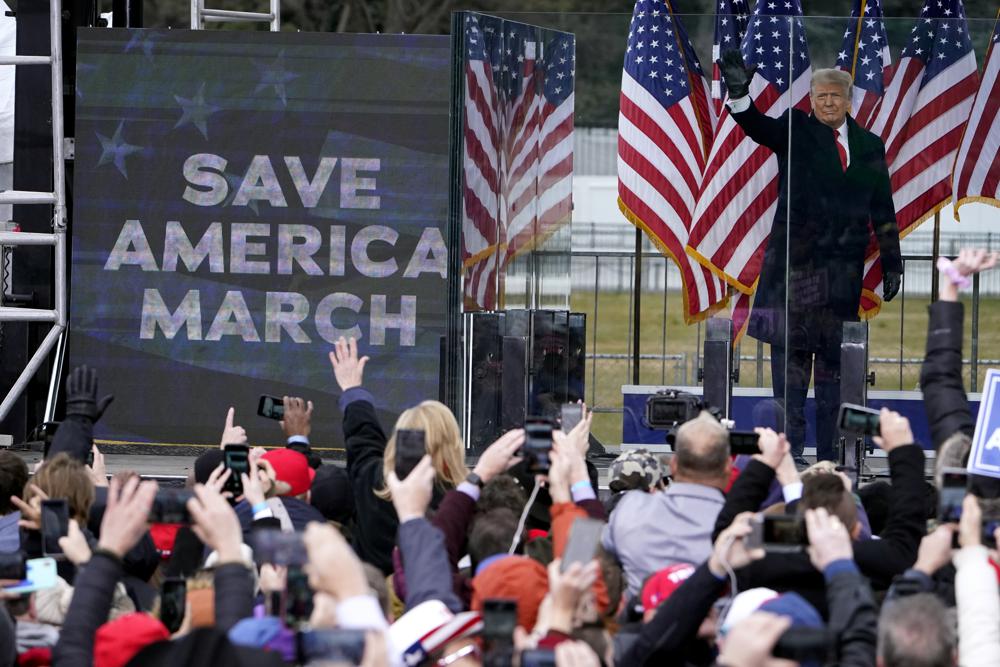White House, January 6 committee agree to shield some documents

The House committee investigating the January 6 insurrection at the Capitol has agreed to defer its attempt to get hundreds of pages of records from the Trump administration, holding off at the request of the Biden White House. The deferral is in response to concerns by the Biden White House that releasing all the Trump administration documents sought by the committee could compromise national security and executive privilege. President Joe Biden has repeatedly rejected former President Donald Trump’s blanket efforts to cite executive privilege to block the release of documents surrounding that day. But Biden’s White House is still working with the committee to shield some documents from being turned over. Trump is appealing to the Supreme Court to try to block the National Archives and Records Administration, which maintains custody of the documents from his time in office, from giving them to the committee. The agreement to keep some Trump-era records away from the committee is memorialized in a December 16 letter from the White House counsel’s office. It mostly shields records that do not involve the events of January 6 but were covered by the committee’s sweeping request for documents from the Trump White House about the events of that day. Dozen of pages created January 6 don’t pertain to the assault on the Capitol. Other documents involve sensitive preparations and deliberations by the National Security Council. Biden’s officials were worried that if those pages were turned over to Congress, that would set a troublesome precedent for the executive branch, no matter who is president. Still, other documents are highly classified, and the White House asked Congress to work with the federal agencies that created them to discuss their release. “The documents for which the Select Committee has agreed to withdraw or defer its request do not appear to bear on the White House’s preparations for or response to the events of January 6, or on efforts to overturn the election or otherwise obstruct the peaceful transfer of power,” White House deputy counsel Jonathan Su wrote in one of two letters to the committee obtained Tuesday by The Associated Press. Su wrote that for the committee, withholding the documents “should not compromise its ability to complete its critical investigation expeditiously.” Committee spokesman Tim Mulvey said: “The committee has agreed to defer action on certain records as part of the accommodations process, as was the case with an earlier tranche of records. The Select Committee has not withdrawn its request for these records and will continue to engage with the executive branch to ensure the committee gets access to all the information relevant to our probe.” For the last several months, the National Archives has been transmitting tranches of documents to the White House and to lawyers for Trump to determine whether they contain any privileged information. Trump has raised both broad objections to the release of the documents as well as specific concerns about particular documents. The National Archives has said that the records Trump wants to block include presidential diaries, visitor logs, speech drafts, handwritten notes “concerning the events of January 6” from the files of former chief of staff Mark Meadows, and “a draft Executive Order on the topic of election integrity.” Biden has repeatedly rejected Trump’s claims of executive privilege over those documents, including in a letter sent December 23 regarding about 20 pages of documents. “The President has determined that an assertion of executive privilege is not in the best interests of the United States and therefore is not justified,” White House counsel Dana Remus reiterated in the latest letter. Trump has taken to the courts to block the document releases. A federal appeals court ruled this month against Trump, and he has filed an appeal to the Supreme Court, though the high court has yet to decide whether to take up the case. Judge Patricia Millett, writing for the court in the December 9 opinion, said Congress had a “uniquely vital interest” in studying the events of January 6, and Biden had made a “carefully reasoned” determination that the documents were in the public interest and that executive privilege should therefore not be invoked. Trump also failed to show any harm that would occur from the release of the sought-after records, Millett wrote. “On the record before us, former President Trump has provided no basis for this court to override President Biden’s judgment and the agreement and accommodations worked out between the Political Branches over these documents,” the opinion stated. Republished with the permission of the Associated Press.
Court rejects Donald Trump’s efforts to keep records from January 6 panel

A federal appeals court ruled Thursday against an effort by former President Donald Trump to shield documents from the House committee investigating the January 6 insurrection at the Capitol. In a 68-page ruling, the three-judge panel tossed aside Trump’s various arguments for blocking through executive privilege records that the committee regards as vital to its investigation into the run-up to the deadly riot that was aimed at overturning the results of the 2020 presidential election. Judge Patricia Millett, writing for the court, said Congress had a “uniquely vital interest” in studying the events of January 6, and that President Joe Biden had made a “carefully reasoned” determination that the documents were in the public interest and that executive privilege should therefore not be invoked. Trump also failed to show any harm that would occur from the release of the sought-after records, Millett wrote. “On the record before us, former President Trump has provided no basis for this court to override President Biden’s judgment and the agreement and accommodations worked out between the Political Branches over these documents,” the opinion states. It adds, “Both Branches agree that there is a unique legislative need for these documents and that they are directly relevant to the Committee’s inquiry into an attack on the Legislative Branch and its constitutional role in the peaceful transfer of power. The appeals court ruled that the injunction that has prevented the National Archives from turning over the documents will expire in two weeks, or when the Supreme Court rules on an expected appeal from Trump, whichever is later. Lawyers for Trump can also ask the entire appeals court to review the case. Seven of the 11 appellate judges on the court were appointed by Democratic presidents, four by Republican presidents. The panel’s leaders, Reps. Bennie Thompson, D-Miss., and Liz Cheney, R.-Wyo., hailed the ruling, saying it “respects the Select Committee’s interest in obtaining White House records and the President’s judgment in allowing those records to be produced. Our work moves ahead swiftly. We will get to the truth.” But Trump’s spokeswoman said the matter was far from settled. “Regardless of today’s decision by the appeals court, this case was always destined for the Supreme Court,” Liz Harrington said. “President Trump’s duty to defend the Constitution and the Office of the Presidency continues, and he will keep fighting for every American and every future Administration.” In its ruling, the court said the executive privilege being asserted by Trump is not a personal privilege but instead one that he “stewards” for the “benefit of the Republic.” “The interests the privilege protects are those of the Presidency itself, not former President Trump individually. And the President has determined that immediate disclosure will promote, not injure, the national interest, and that delay here is itself injurious,” the opinion states. Biden had the committee defer its requests for some of the early documents that might have posed privilege claims, and officials expect more documents in subsequent tranches will be subject to the same outcome. The court praised Biden’s “calibrated judgment” in working with Congress and the Archives to weigh privilege concerns, saying it “bears no resemblance to the ‘broad and limitless waiver’ of executive privilege former President Trump decries.” White House spokesman Mike Gwin said, “As President Biden determined, the constitutional protections of executive privilege should not be used to shield information that reflects a clear and apparent effort to subvert the Constitution itself.” Trump sued the House January 6 committee and the National Archives to stop the White House from allowing the release of documents related to the insurrection. Biden had waived Trump’s executive privilege claims as the current officeholder. At issue, the court said, is not that Trump “has no say in the matter” but rather his failure to show that withholding the documents should supersede Biden’s “considered and weighty judgment” that Congress is entitled to the records. The National Archives has said that the records Trump wants to block include presidential diaries, visitor logs, speech drafts, handwritten notes “concerning the events of January 6” from the files of former chief of staff Mark Meadows, and “a draft Executive Order on the topic of election integrity.” Arguing for the committee, U.S. House lawyer Douglas Letter argued that the determination of a current president should outweigh predecessors in almost all circumstances and noted that both Biden and Congress were in agreement that the January 6 records should be turned over. All three of the appeals court judges who heard the arguments were nominated by Democrats. Millett and Judge Robert Wilkins were nominated by former President Barack Obama. Judge Ketanji Brown Jackson is a Biden appointee seen as a contender for a Supreme Court seat should one open during the current administration. Republican presidents nominated six of the nine Supreme Court justices, including three chosen by Trump. Republished with the permission of the Associated Press.
Court temporarily delays release of Donald Trump’s January 6 records

A federal appeals court on Thursday temporarily blocked the release of White House records sought by a U.S. House committee investigating the Jan. 6 insurrection, granting — for now — a request from former President Donald Trump. The administrative injunction issued by the U.S. Court of Appeals for the District of Columbia Circuit effectively bars until the end of this month the release of records that were to be turned over Friday. The appeals court set oral arguments in the case for Nov. 30. The stay gives the court time to consider arguments in a momentous clash between the former president, whose supporters stormed the Capitol on Jan. 6, and President Joe Biden and Congress, who have pushed for a thorough investigation of the riot. It delays the House committee from reviewing records that lawmakers say could shed light on the events leading up to the insurrection and Trump’s efforts to delegitimize an election he lost. The National Archives, which holds the documents, says they include call logs, handwritten notes, and a draft executive order on “election integrity.” Biden waived executive privilege on the documents. Trump then went to court, arguing that as a former president, he still had the right to exert privilege over the records, and releasing them would damage the presidency in the future. U.S. District Judge Tanya Chutkan on Tuesday rejected those arguments, noting in part, “Presidents are not kings, and Plaintiff is not President.” She again denied an emergency motion by Trump on Wednesday. In their emergency filing to the appeals court, Trump’s lawyers wrote that without a stay, Trump would “suffer irreparable harm through the effective denial of a constitutional and statutory right to be fully heard on a serious disagreement between the former and incumbent President.” The Nov. 30 arguments will take place before three judges nominated by Democratic presidents: Patricia Millett and Robert Wilkins, nominated by former President Barack Obama, and Ketanji Brown Jackson, an appointee of Biden. Given the case’s magnitude, whichever side loses before the circuit court is likely to eventually appeal to the U.S. Supreme Court. The White House on Thursday also notified a lawyer for Mark Meadows, Trump’s former chief of staff, that Biden would waive any executive privilege that would prevent Meadows from cooperating with the committee, according to a letter obtained by The Associated Press. The committee has subpoenaed Meadows and more than two dozen other people as part of its investigation. His lawyer, George Terwilliger, issued a statement in response saying Meadows “remains under the instructions of former President Trump to respect longstanding principles of executive privilege.” “It now appears the courts will have to resolve this conflict,” Terwilliger said. The committee late Thursday threatened to begin contempt proceedings against Meadows if he doesn’t change course and comply. “Simply put, there is no valid legal basis for Mr. Meadows’s continued resistance to the Select Committee’s subpoena,” the committee wrote to Terwilliger, saying it would view Meadows’ failure to turn over documents or appear at a scheduled deposition on Friday as “willful non-compliance.” The House has already referred former Trump adviser Steve Bannon to the Justice Department for potential criminal prosecution for contempt of Congress. Republished with the permission of the Associated Press.


